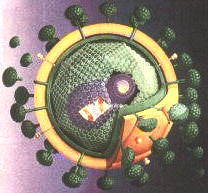Sudan launches HIV/AIDS awareness campaign
Oct 18, 2005 (KHARTOUM) — Sudan’s government and the United Nations Children’s Fund launched a national awareness campaign Tuesday for HIV/AIDS, which has claimed the lives of 23,000 Sudanese and is jeopardizing dividends from a January peace deal that ended this country’s 21-year civil war.

“If the disease kills the future generations, then the peace agreement would be useless because it would find no one to benefit from it,” Malik said.
The Sudanese government and the former rebel Sudan People’s Liberation Army signed a peace agreement in January that ended the north-south civil war, which claimed over 2 million lives mostly through war-induced famine and disease.
“Stigma is still considered as a major problem facing the anti-AIDS campaign,” said Malik, who added the media had a key role to play in halting the disease’s spread in Sudan.
The southern war prevented the government from conducting surveys on the disease, which has caused a major “problem” in three main towns in the south _ Juba, Wau and Melkal, said Mohammed Abdel Hafeez, program manager for the Sudan National AIDS Program.
Last month, a United Nation Development Program report said the HIV/AIDS epidemic in southern Sudan is “believed to have moved in the generalized phase … where infection has gone beyond high-risk groups into the general population.”
Abdel Hafeez said his program faced basic problems like poor health services, insufficient medicine and social stigmas when talking to children about the relationship between HIV/AIDS and sexual intercourse.
But Sudan’s government has trained a group of mosque imams and preachers to spread awareness about efforts to detect the disease and prevent its spread, he said.
A UNICEF report said 75 percent of women aged 15-49 don’t know HIV can be transmitted from mother-to-child, while more than 35 percent of young people think HIV can be transmitted through mosquito bites. A quarter of young people believe the virus can be transmitted by sharing a meal with a person living with HIV/AIDS.
Less than 10 percent out of almost 75 percent of Sudanese aged between 19 and 24 are fully aware of how to use condoms correctly, while just 23 percent know HIV can be transmitted through unprotected sex.
(AP/ST)
